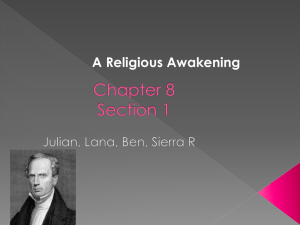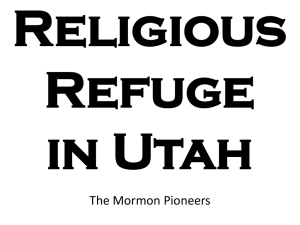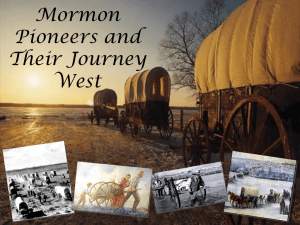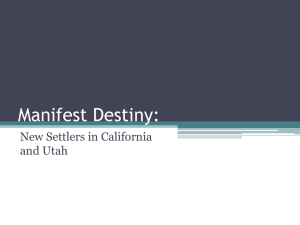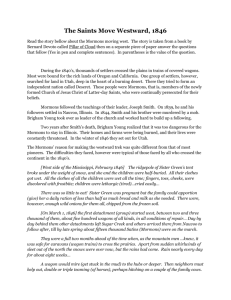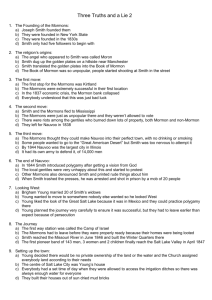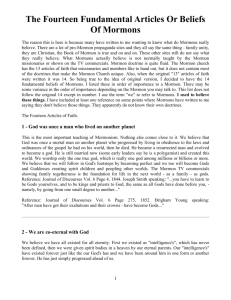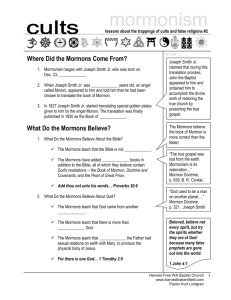second ethnographic presentation
advertisement
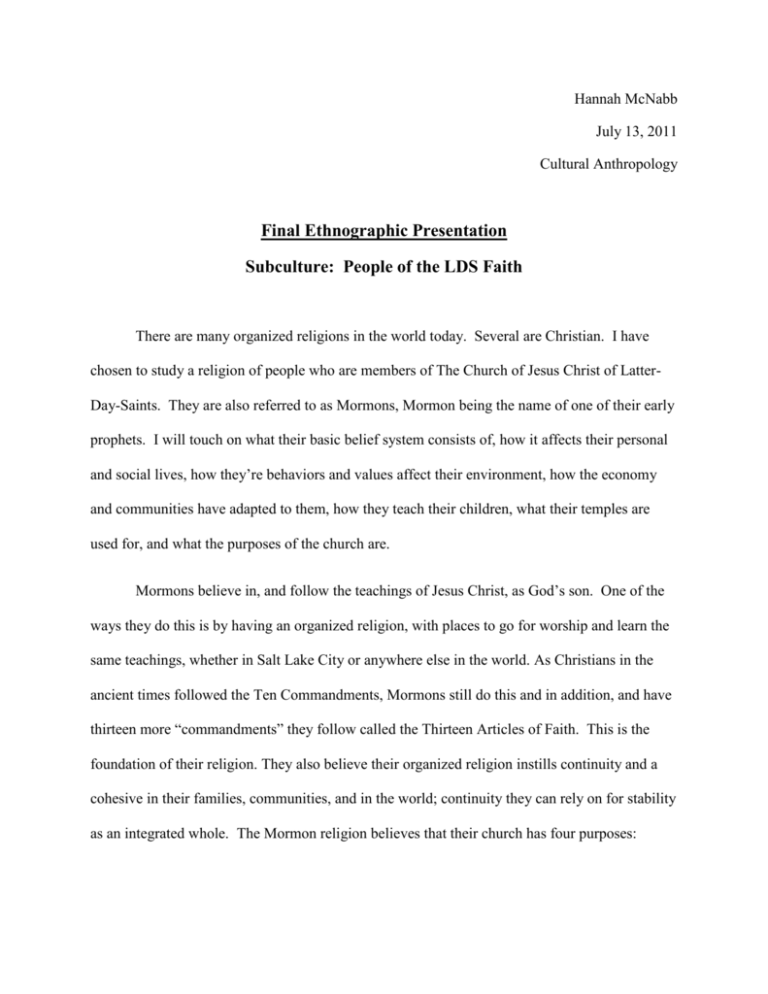
Hannah McNabb July 13, 2011 Cultural Anthropology Final Ethnographic Presentation Subculture: People of the LDS Faith There are many organized religions in the world today. Several are Christian. I have chosen to study a religion of people who are members of The Church of Jesus Christ of LatterDay-Saints. They are also referred to as Mormons, Mormon being the name of one of their early prophets. I will touch on what their basic belief system consists of, how it affects their personal and social lives, how they’re behaviors and values affect their environment, how the economy and communities have adapted to them, how they teach their children, what their temples are used for, and what the purposes of the church are. Mormons believe in, and follow the teachings of Jesus Christ, as God’s son. One of the ways they do this is by having an organized religion, with places to go for worship and learn the same teachings, whether in Salt Lake City or anywhere else in the world. As Christians in the ancient times followed the Ten Commandments, Mormons still do this and in addition, and have thirteen more “commandments” they follow called the Thirteen Articles of Faith. This is the foundation of their religion. They also believe their organized religion instills continuity and a cohesive in their families, communities, and in the world; continuity they can rely on for stability as an integrated whole. The Mormon religion believes that their church has four purposes: proclaiming the gospel, perfecting the Saints, redeeming the dead, and caring for the poor and needy. Their first purpose: Proclaiming the gospel, means getting the gospel message to every “kindred tongue and people,” from one end of the earth to the other. They do this through missionary work, most of which is done by 19 year old single men who serve two years away from home. They do this voluntarily, and fund it themselves, sometimes with their families help. The second: Perfecting the Saints means actually “living” the gospel. Their religion is an organized one. No matter where you are in the world, everything is the same: rules, instruction manuals for classes, church meetings, modesty in dress, etc. Parents teach their children by example: taking them to church, living the word of wisdom in the home, not smoking or drinking, serving others, and giving compassionate service. Modesty in dress and thought also governs the behavior of Mormons. Since they believe in eternal life, and that families are forever, most members of the Church do these things diligently. The third purpose is to Redeem the Dead. Mormons believe in life after death and families will be reunited. They also believe their spirits will be reunited with their bodies. For this reason, they treat their bodies as sacred. They even have a specific creed in this regard called the Word of Wisdom. There are buildings called Temples, all over the world, where saving ordinances are performed for those that have died. The Mormons believe everyone on the earth will need these ordinances to be done. So they are asked to start with their own extended families and then to participate in helping those people who don’t have families who are members of the church; some of which lived hundreds of years ago. The Temples are considered sacred, a place for meditation and peace. The fourth purpose is Caring for the Poor and the Needy. Just as in the bible in Jesus’ time, Mormons believe in looking outside of themselves. They strongly believe in compassionate service, and even have organizations called “The Relief Society,” visiting teachers, and home teachers who are responsible for a small number of members of the church to provide help and comfort. They don’t have to just be poor of money, but can be poor in spirit, or going through hard emotional times, and need support. They also discreetly report to their bishop (pastor or leader or each ward) if their needs are great and they need more help. The bishop has funds available for these needs because Mormons believe in paying tithing. The definition of “tithe” is “one/tenth.” So Mormons pay 1/10th of their gross income to help the poor and needy first in their own communities, but also to help non-members and disaster victims all over the world. By Mormons paying tithing, and the bishop dispersing the funds as needed, in the church community it lightens the burden from other state/federal agencies such as food stamps, welfare, housing assistance etc. Other ways communities are helped by Mormons, are the service projects that youth groups perform, the extensive projects done by young men in order to attain the rank of Eagle in the Boy Scouts of America Association, and the generally friendliness with their neighbors and close communities. I have observed in my consultant’s neighborhood many families taking walks in the evening, and even more so on Sundays. Many of them stop and visit along the way. Another thing I have observed is how much quieter the community is on Sundays and there seems to be less traffic, very few lawn mowers going. Sitting on the porch I mainly hear dogs barking and children laughing. Mormons restfulness and slower pace one day a week not only keeps them physically and mentally healthy, but that peacefulness is enjoyed by everyone in their community. Sundays are reserved for church services and family get-togethers. This is why I have observed neighborhoods being less busy. Many stores are closed on Sundays, which is a direct result of the LDS religion and the way it affects Utah’s economy. This is because Mormons generally do not shop, to restaurants, or do anything that makes others work instead of rest on this particular day of the week. Since Mormons do not drink alcohol or use tobacco products, the liquor shops and cigarette shops are very few and far between. As a matter of fact, the liquor stores in Utah are run by the state. The alcohol content of beer available in Utah is less that in many surrounding states. The liquor stores are closed on Sundays as well due to the lessened demand of alcohol. There are also many other stores effected on this day because of the lack of consumers. The ways Mormons wear clothing dictate the supply and demand of many stores in Utah. Things like longer shorts, sleeved shirts, higher neck lines, and less revealing swimsuits are more available in communities with large Mormon populations. There are also stores specific to Mormon purchasing. Most LDS young men serve missions for their church after high school. There are stores in Salt Lake City dedicated specifically for this purpose as well as stores that carry specific clothing for baptisms, baby blessings, and temple work. Members of the Church of Jesus Christ of Latter-Day-Saints, Mormons, believe similarly to other Christian religions. They believe in Jesus Christ and tried to live as he did in their everyday lives, thereby creating a consistent system that makes this religion cohesive. They also believe their organized religion instills continuity and a cohesiveness in their families, communities, and in the world; continuity they can rely on for stability as an integrated whole. I have very much enjoyed learning more about the sub-culture of Mormons. They are a very interesting and inspiring group. BIBLIOGRAPHY Cultural Anthropology by Nancy Bonvillain Field Notes #1, #2, #4, #5
